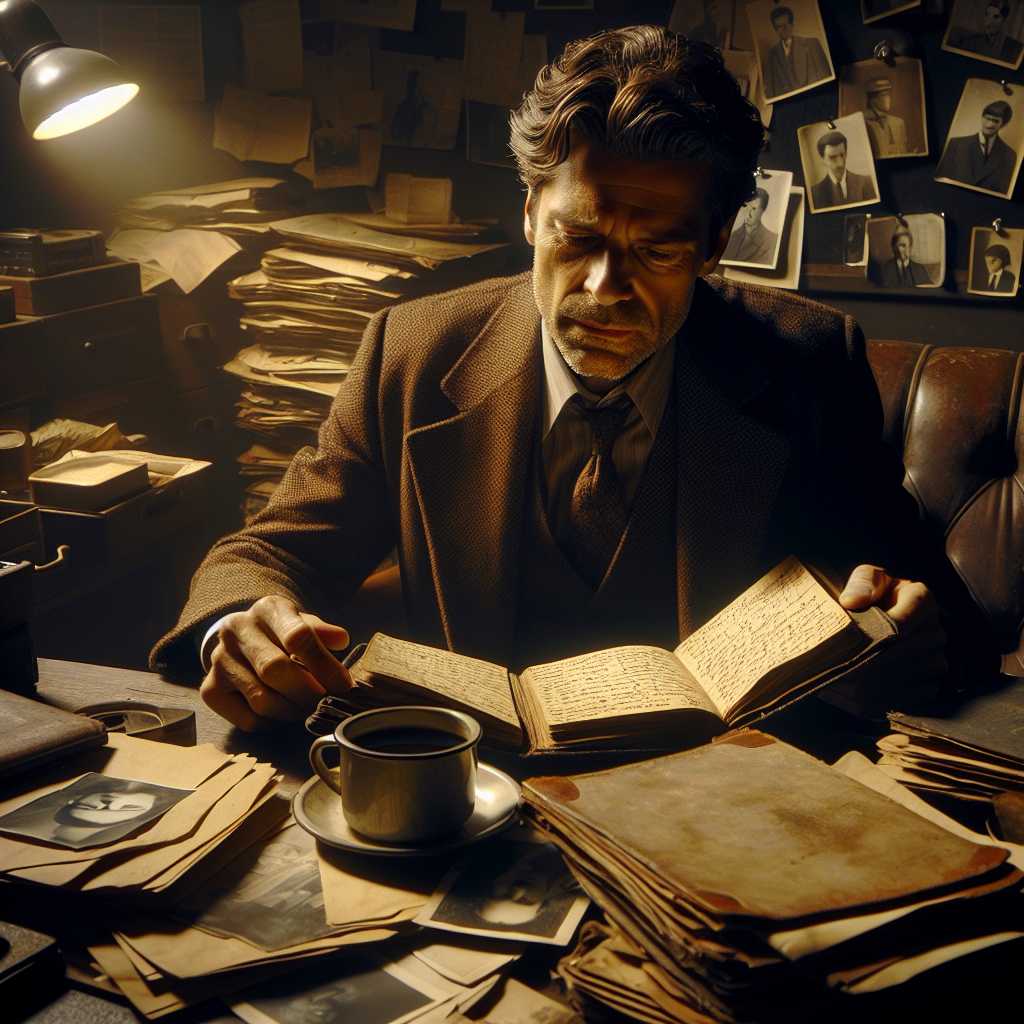
In the heart of the bustling city of New Haversham lay crooked lanes and stories untold, where the glimmer of danger was as common as the cobblestones underfoot. It was in these shadowed alleys that our tale unfolds, with the sharp mind of Detective Arthur Langdon at its core. Langdon, a man whose reputation was built on a foundation of closed cases and the whispers of a sixth sense for the uncanny, received an unusual letter that arrived under the door of his fifth-floor apartment.
The letter was neatly folded, the cursive handwriting dancing elegantly across the page like a siren's song. "Urgent assistance required at the Blackwood residence. Affairs most disquieting are underway. Anonymity is paramount." A seal pressed deep in emerald wax bore the emblem of a raven in mid-flight.
Langdon's curiosity was piqued. Anonymity and urgency rarely went hand in hand without a rather compelling story. Not allowing the dusk to settle, he took his coat and hat, clicking the door of his apartment shut with the soft assurance of an expert in his domain. The city's ambient noises greeted him as he made his way to the infamous Blackwood estate, an imposing edifice shadowed by elder trees and wrapped in whispers of its former grandeur.
Upon his arrival, Langdon was ushered in by a servant with eyes that spoke of fear and resignation. The halls echoed with history and something more—an undertone of unrest palpable in the air. He was led to the drawing room, where a man stood awaiting him—a silhouette framed by the room's dimly lit ambiance. "Detective Arthur Langdon, I presume?" inquired the shadowed figure, his voice steady yet tinged with underlying distress.
"You presume correctly, Mr...?" Langdon probed, his grey eyes scanning his counterpart.
With a reluctant sigh, the figure stepped forward—Edgar Blackwood, the last heir to the crumbling dynasty. "I requested your presence for a matter most curious. My uncle, Franklin Blackwood, has passed under circumstances I believe to be no mere twist of fate."
Despite the gravity of the situation, Langdon noted the pause between 'uncle' and 'has passed,' as if puppet strings of hesitation controlled Edgar's tongue. "And what makes you suspect foul play, Mr. Blackwood?" the detective inquired.
Edgar's eyes darted to the ornate grandfather clock ticking away moments of comfort. "My uncle was a man of routine, every evening retiring to his study for brandy and books. Yet, two nights ago, he was found here," Edgar gestured to the room they occupied, "with not a soul acknowledging their part in his relocation."
Langdon approached the scene with analytical detachment, his gaze fixated on the patterned carpet that held no indication of having been disturbed recently. "The study, if you please," he requested, and Edgar led him through corridors laden with ancestral portraits eyeing them with unspoken judgments.
The study was a splendor of leather and mahogany, permeated by the lingering scent of pipe smoke. Langdon examined the room, every book and trinket demanding his attention. It was the book on the desk, lying conspicuously open, that finally drew him. "Gruesome Tales of the Seaside," the spine read—a collection of fictional horrors unfitting for a man reputed to abstain from such thrills.
Edgar shifted uncomfortably. "He disliked such genres, always favoring non-fiction. It's out of place."
Langdon nodded, his thoughts a whirlwind of possibilities. He noted a missing volume from the bookcase, the dust barely settled around the vacancy. "What book is missing here?" he asked, turning to Edgar with an unspoken expectation.
With a furrowed brow, Edgar replied, "That would be his diary. My uncle kept a daily record without fail."
Herein lay the crux of the mystery, thought Langdon—the missing link to deciphering the night's events. He requested the names of all present in the household on the night of Franklin Blackwood's untimely demise, which Edgar provided alongside the declaration of their innocence.
Langdon's next hours were spent in interrogation, his observant gaze dissecting alibis and uncovering secrets. Yet, it was the youngest maid, her hands fumbling nervously, who provided the revelation. "Sir, I saw Master Edgar, he was... carrying a book from the study. I thought naught of it, as it was his right."
Confronting Edgar with the newfound evidence was a task Langdon approached with equal measures of ethics and anticipation. Edgar's denials were valiant but short-lived, crumbling under the weight of truth. "The diary, Mr. Blackwood? A confession of sorts, perhaps?" Langdon conjectured with calm assurance.
Edgar's composure shattered like the façade of his noble lineage. With the diary recovered, revealing an intention to disinherit Edgar in favor of a charitable foundation, the case closed around the desperate heir like the iron gates of justice. Edgar surrendered to the consequences of his actions, undone by his greed and the astute perception of Detective Arthur Langdon.
As the sun rose over New Haversham, washing its dark corners with light and exposing the deeds of the night, Detective Langdon walked away from the Blackwood estate—a beacon of truth in a city that thrived on shadows. The chapter was closed, and within the pages of his own records, he inscribed the details of the case, ensuring the legacy of his pursuit of justice would endure long after the whispers ceased.
And so, the storyteller spun the tale of a detective whose keen mind and unrelenting resolve pierced through the veils of deceit—a tale that echoed in the hallowed halls of both the mighty and the meek, reminding all that the currency of truth remains ever formidable amongst the coinage of lies.










